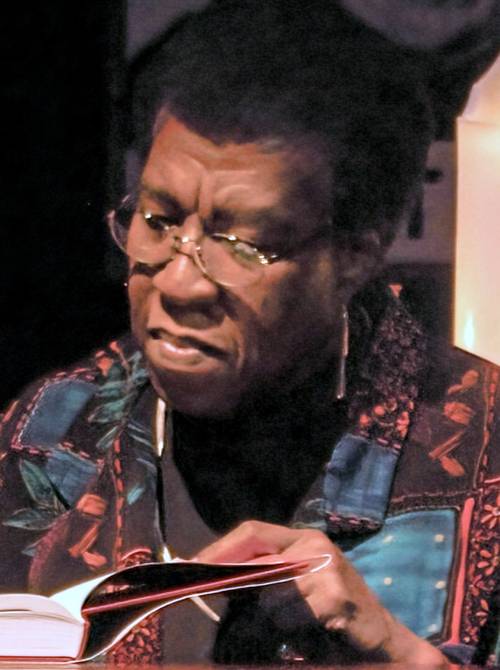
FAQ About Octavia E. Butler

Who was Octavia E. Butler?
Octavia E. Butler was an acclaimed American science fiction writer, renowned for her thought-provoking works that addressed complex themes such as race, gender, and humanity. She was born on June 22, 1947, in Pasadena, California, and became one of the most prominent voices in science fiction, breaking barriers as an African American woman in a predominantly white, male genre. Butler's works continue to influence writers and readers, and she remains celebrated for her unique perspectives and storytelling.

What are some of Octavia E. Butler's most famous works?
Some of Octavia E. Butler's most famous works include the Patternist series, the Xenogenesis series (also known as the Lilith's Brood series), and the standalone novels Kindred and Parable of the Sower. These works are known for their deep exploration of social issues, complex characters, and imaginative settings. Kindred, for example, blends science fiction with historical fiction to tackle themes of slavery and identity.

What themes did Octavia E. Butler explore in her writing?
Octavia E. Butler's writing explored a wide range of themes, including issues of race, gender, and power dynamics. She often examined the societal structures that influence human behavior and questioned how different identities shape experiences. Her narratives delved into concepts of survival, adaptation, and the potential of humanity to change, frequently set against the backdrop of dystopian or speculative futures. Her work challenges readers to reflect on their values and the world around them.

Why is Octavia E. Butler considered a groundbreaking author in science fiction?
Octavia E. Butler is considered groundbreaking because she brought diverse voices and perspectives to a genre that was traditionally dominated by white male authors. She broke stereotypes and barriers through her storytelling, focusing on marginalized characters and highlighting issues of race, gender, and social justice. She was the first science fiction writer to receive a MacArthur Fellowship, also known as the "Genius Grant," which further underscores her innovative impact on the genre.

What awards did Octavia E. Butler win during her career?
Octavia E. Butler received numerous awards recognizing her contributions to literature, including the prestigious Hugo and Nebula Awards. She was the first science fiction writer to receive the MacArthur Fellowship in 1995. Her novel Parable of the Talents won the Nebula Award for Best Novel in 1999. Her writing has earned her a lasting legacy as a pioneering author who expanded the possibilities of speculative fiction.

How did Octavia E. Butler's background influence her writing?
Octavia E. Butler's background significantly influenced her writing. Growing up in Pasadena, California, during a time of social change and racial tension, she experienced firsthand the challenges of an African American woman in America. Her upbringing instilled in her a deep awareness of social injustice, which is evident in the recurring themes of race and gender in her work. Despite these challenges, Butler was driven by her passion for storytelling, using speculative fiction as a means to explore and address these complex issues.

What is the significance of the novel 'Kindred'?
Kindred is one of Octavia E. Butler's most celebrated novels, significant for its unique blend of science fiction and historical fiction. The story follows an African American woman who is inexplicably transported from 1970s California to the antebellum South, where she confronts the brutal realities of slavery. Through this narrative, Butler explores themes of race, identity, and history, offering a poignant and innovative examination of American slavery and its lasting impact on contemporary society.

How did Octavia E. Butler impact future generations of writers?
Octavia E. Butler has had a profound impact on future generations of writers, particularly in the realms of science fiction and speculative fiction. She opened doors for writers of color and women in a genre that had been largely exclusive. Her work challenged conventions and provided a blueprint for inclusive storytelling, inspiring countless writers to explore new narratives that address social issues, diversity, and equality.

What is 'Parable of the Sower' about?
Parable of the Sower is a dystopian novel set in a future America where society has collapsed due to climate change, chronic wealth inequality, and corporate greed. The protagonist, Lauren Olamina, is a young woman with a revolutionary vision of a better society. As she journeys through this desolate landscape, she develops a new belief system called Earthseed, which becomes central to the novel's theme of hope and resilience in the face of adversity. The novel is celebrated for its foresight and relevance to contemporary issues.

What distinctive narrative techniques did Octavia E. Butler use in her stories?
Octavia E. Butler was known for her distinctive narrative techniques, which often included non-linear storytelling and multiple perspectives. She utilized speculative elements to create complex, immersive worlds while maintaining a strong focus on character development and emotional depth. Her ability to blend genres, such as science fiction and historical fiction, further distinguished her work, allowing her to explore poignant social themes in a unique way.

What influence did Octavia E. Butler have on Afrofuturism?
Octavia E. Butler is considered a pioneering figure in Afrofuturism, a cultural movement that explores the intersection of African diaspora culture with technology and science fiction. Through her work, Butler challenged traditional narratives and provided a platform for imagining futures in which people of African descent play central, powerful roles. Her exploration of themes like race, identity, and technology significantly influenced Afrofuturism's growth and recognition as a vital cultural phenomenon.

Did Octavia E. Butler write any non-fiction works?
While Octavia E. Butler is best known for her fiction, she also wrote essays and gave talks that discussed writing, her personal experiences, and societal issues. Many of these essays provide insight into her views on race, writing, and the science fiction genre. Her essay "Positive Obsession," published in the collection Bloodchild and Other Stories, discusses her journey as a writer and her determination to succeed despite numerous obstacles.

What inspired Octavia E. Butler to write science fiction?
Octavia E. Butler was inspired to write science fiction by a desire to tell stories that reflected her unique perspective and to address societal issues through imaginative narratives. From a young age, she was an avid reader and was drawn to science fiction for its creative potential and ability to explore the human condition. She aimed to create more diverse and representative characters within the genre, often inspired by her own experiences and observations of social injustice.

Are there any films or adaptations of Octavia E. Butler's works?
Though adaptation of Octavia E. Butler's works has been limited, they are gaining attention for potential film and television projects. Her novel Parable of the Sower has been planned for adaptation into a series. Furthermore, Kindred has gained interest as a television adaptation, showcasing the growing recognition and interest in her stories for visual media.

What educational background did Octavia E. Butler have?
Octavia E. Butler studied at Pasadena City College and later attended California State University, Los Angeles. She also took writing courses through the University of California, Los Angeles (UCLA) Extension, which helped refine her skills. Although she faced various challenges in her educational journey, Butler was an autodidact and attributed much of her success to her own dedication to learning and improving her craft independently.

How has Octavia E. Butler been honored posthumously?
After her passing in 2006, Octavia E. Butler continued to be recognized and celebrated through various honors and accolades. Her work has been included in academic and literary discussions, and she has been acknowledged as a foundational figure in science fiction. Libraries, awards, and scholarships have been named after her, including the Octavia E. Butler Memorial Scholarship, which supports writers of color pursuing literary careers in science fiction.

Did Octavia E. Butler collaborate with other authors or artists?
Octavia E. Butler primarily worked independently but had interactions and correspondences with other authors and artists throughout her career. Her influence extended through these interactions as she mentored and encouraged emerging writers. Butler's legacy includes inspiring diverse voices to explore complex social issues through speculative fiction.

What is the 'Patternist' series about?
The Patternist series is a collection of novels by Octavia E. Butler that explores themes of telepathy and societal evolution. The series traces the history of an elite group of telepaths known as the Patternists, from their origins to their eventual dominance over regular humans. Each book in the series, including Mind of My Mind and Patternmaster, builds on an intricate narrative of power struggles, genetic mutation, and the complexities of human relationships.

What impact did 'Bloodchild and Other Stories' have on readers?
Bloodchild and Other Stories is a collection that showcases Octavia E. Butler's range and depth as a speculative fiction writer. The story "Bloodchild" itself, a profound exploration of symbiotic relationship dynamics, won both the Hugo and Nebula Awards. Readers and critics have praised the collection for its imaginative storytelling and the way it addresses themes of autonomy, power, and ethics, offering a compelling glimpse into Butler's thematic concerns and literary prowess.

How did Octavia E. Butler address gender issues in her work?
Octavia E. Butler addressed gender issues by creating nuanced, complex characters who often challenged traditional gender roles and expectations. Her works presented women as central figures with strength and agency, and her stories frequently explored the intersections of gender with race and class. Through speculative narratives, Butler examined how power dynamics shape gender relations and questioned societal norms, encouraging readers to reconsider their perceptions of gender.
